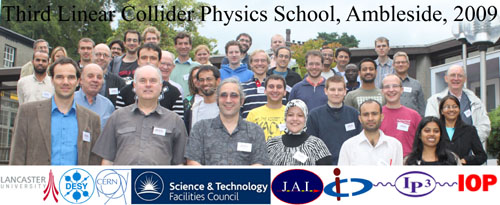Physics summer school gets international backing

A Lancaster University summer school is set to become a regular fixture after physics students from around the world gave it their seal of approval.
The Linear Collider Physics School held in the Lake District August 17 to 23 was set up to explore the physics of the next generation of particle colliders – known as linear colliders – which are anticipated to help answer fundamental questions about what the universe is made of.
The proposed linear collider will be a machine for precision measurements, designed to complement the Large Hadron Collider, at the European Centre for Nuclear Research (CERN) in Geneva, Switzerland, together unlocking some of the deepest mysteries in the universe.
Around 50 participants from 15 different countries attended the event which gives students and post doctoral researchers the opportunity to learn more about the potential of a Linear Collider and to discuss their research with world-leading experts.
Student feedback was overwhelmingly positive and the event is now set to run every three years.
The Linear Collider Physics School is primarily organized by Lancaster University’s Physics Department and follows earlier successful schools in 2003 and 2006.
Dr Andre Sopczak of Lancaster University Department of Physics said:
“The circular Large Hadron Collider at CERN Geneva is expected to do a first survey of high energy particle collisions at around a trillion times the energy provided to an electron by a 1 Volt battery. But a Linear Collider is best placed to make detailed measurements of any new particles discovered as a result of such high energy collisions.“Training of a new generation of particle physicists is very important and this School has contributed towards this goal.
“The great variety of nationalities of the participants was particularly welcomed by the students used the school as a valuable opportunity to establish new contacts around the world. They have been a highly motivated group and their talent will surely contribute significantly to the field of particle physics in the future.
“Growing international attention to the School coupled with positive feedback has convinced us to continue running the summer school every three years in Ambleside.”
The School has been made possible through the generous support of the following institutions and agencies: Lancaster University, DESY, CERN, STFC, John Adams Institute, Cockcroft Institute, IPPP Durham, and the UK Institute of Physics. The next school is set to take place 18 to 25 August 2012.
The School webpage is http://www.hep.lancs.ac.uk/lc2009school